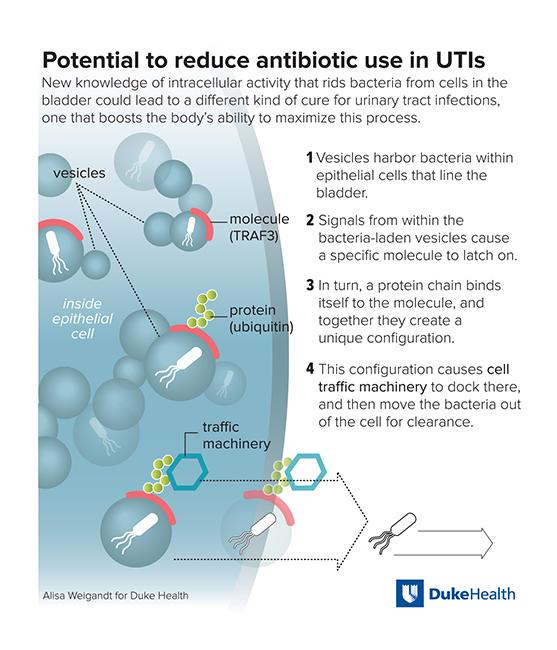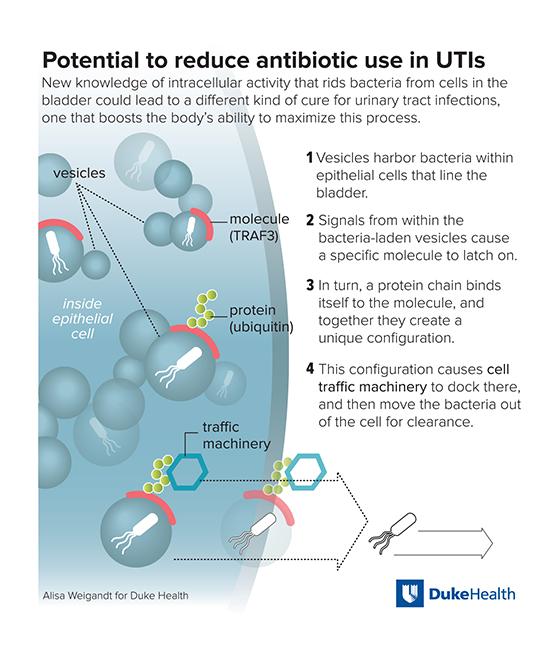
DURHAM, N.C. – The process cells use to secrete chemicals also appears to be the way to clear urinary tract infections, or UTIs, according to a study by researchers from Duke Health and Duke-National University of Singapore Medical School.
The process, which was previously understood to be a way for cells to release soluble materials such as hormones, has been redefined as playing an equally crucial role in protecting the body against infections.
The study, using mice and cultured human bladder cells and reported July 19th in the journal Immunity, not only describes how the cells lining the bladder fight UTI-causing bacteria through the proteins used for cellular secretion, but also suggests new targets for developing remedies for UTIs.
"There is growing interest in identifying new ways to fight UTIs as bacteria are becoming increasingly resistant to antibiotics," said senior author Soman Abraham, Ph.D. He is a professor in the Departments of Pathology, Immunology, and Microbiology and Molecular Genetics at Duke University School of Medicine, and is a professor in the Program in Emerging Infectious Diseases at Duke-National University of Singapore.
Urinary tract infections are the second-most prevalent type of bacterial infection. According to the National Center for Health Statistics, UTI's account for about 8.1 million medical visits a year in the U.S.
Abraham and colleagues have led numerous studies analyzing the immune responses to UTIs. Their research revealed bladder cells actively resist bacterial infection by rapidly expelling invading bacteria to be subsequently cleared in the urine.
The team had previously reported that this expulsion is partially mediated by lysosomes, structures inside the cells that ordinarily degrade waste. Harmful bacteria are shuttled into the lysosomes, which carry them to the cell surface, where they are expelled.
The current study builds on this research, describing another equally powerful mechanism, which works in conjunction with the lysosomes to expel as many bacteria as possible.
"Infecting bacteria are typically encased in a membrane following an invasion of the bladder wall," said Yuxuan Miao, Ph.D., first author of the paper. "We found that the cell's machinery for secreting hormones was capable of recognizing these membrane-encased bacteria and exporting them out of the cell. Our studies also identified, for the first time, the critical 'pick-me-up' signal on the bacteria-encasing membrane responsible for initiating the cell's export process."
"In the past, we identified a plant extract called Forskolin, which has a strong impact on UTIs, even in the absence of antibiotics," Abraham said. "Unfortunately, we didn't understand how it worked. These latest findings could provide the key to how the herb effectively combats UTIs."
Abraham said Forskolin had been known to have a dramatic effect on enhancing the cellular secretion process, and the new research demonstrates that this process is also responsible for bacterial expulsion.
"If this link can be established, we could help advance the case for testing the herb and other similar-acting drugs as a potential new treatment for UTIs," Abraham said.
###
In addition to Abraham and Miao, the study was co-authored by Jianxuan Wu.
The study received financial support from the National Institutes of Health (R01 AI96305, R01 AI35678, R01 DK077159, R01 AI50021, R37 DK50814 and R21 AI056101) and a block grant from Duke-NUS Graduate Medical School, Singapore.
Media Contact
Sarah Avery
[email protected]
919-660-1306
@DukeHealth
http://www.dukehealth.org





